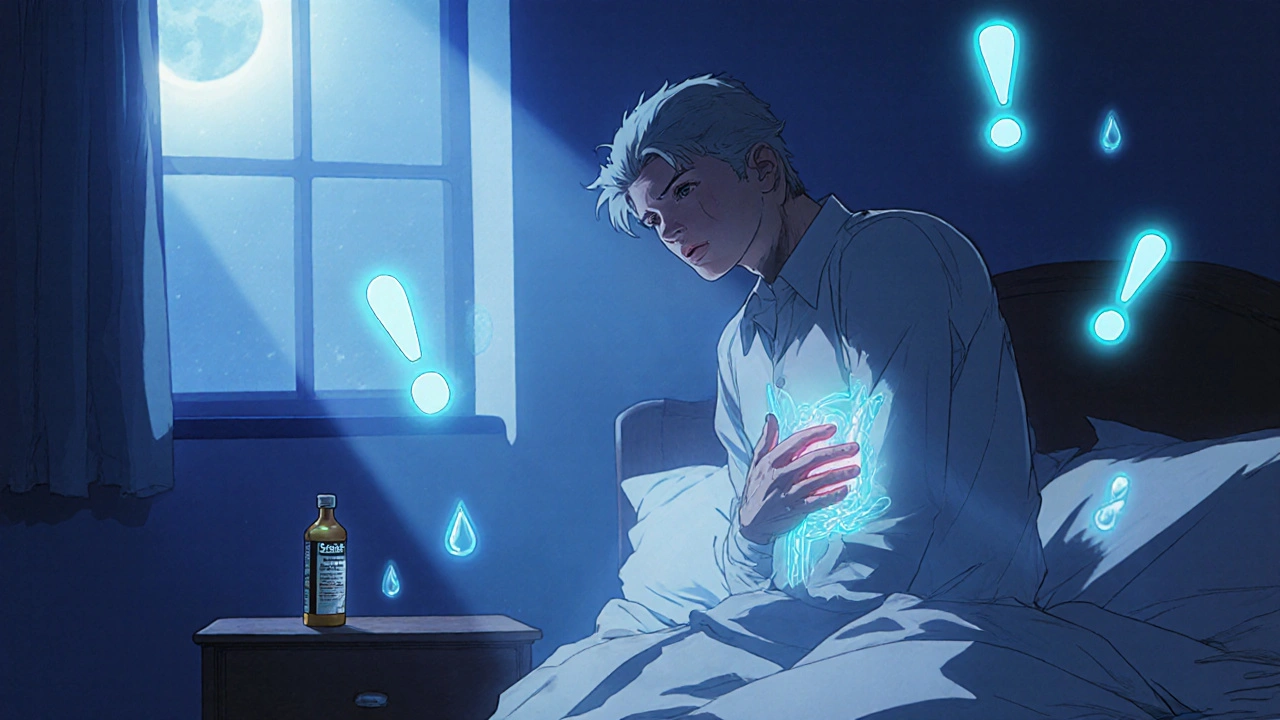BPH Decongestant Risk Calculator
Calculate Your Urinary Retention Risk
Enter your information to determine if you're at risk when taking decongestants.
Men over 50 with an enlarged prostate-known as benign prostatic hyperplasia, or BPH-often deal with frustrating urinary symptoms: weak stream, frequent urges, trouble starting, or feeling like the bladder never fully empties. These aren’t just inconveniences. They can disrupt sleep, limit daily activities, and even lead to serious complications. But there’s one common, over-the-counter remedy that can make these symptoms suddenly much worse: decongestants.
Why Decongestants Are Dangerous for Men with BPH
Most decongestants, especially those with pseudoephedrine (like Sudafed), work by tightening blood vessels in the nose to reduce swelling and stuffiness. But they don’t stop there. These drugs also stimulate alpha-1 receptors in the prostate and bladder neck-areas already overworked and tightened by BPH. The result? Your urethra gets squeezed even tighter.
Studies show that pseudoephedrine can increase urethral resistance by 35-40%. That means your bladder has to push much harder to get urine out. For men with mild BPH, this might just mean a slightly weaker stream. For men with moderate to severe symptoms, it can trigger acute urinary retention-a medical emergency where you simply can’t urinate at all, even though your bladder is full.
The risk isn’t theoretical. A 2021 study in the Journal of Urology found that men with BPH who took pseudoephedrine were 2.8 times more likely to experience acute urinary retention. That number jumps to a 3.45-fold increase in some analyses. And it’s not just one dose-it’s the cumulative effect. Pseudoephedrine stays in your system for 12 to 16 hours. One pill can cause problems that last nearly a full day.
Who’s Most at Risk?
Age is the biggest factor. Men over 70 are at dramatically higher risk. A 2016 NIH study showed that 51.8% of men over 70 with BPH developed measurable worsening of urinary symptoms after taking pseudoephedrine. Compare that to just 17.3% of men under 50. The older you are and the more advanced your BPH, the less tolerance your body has for these drugs.
It’s not just about age. Men with an IPSS (International Prostate Symptom Score) of 12 or higher-indicating moderate to severe symptoms-are at highest risk. Dr. Claus Roehrborn, a leading urologist and co-author of the American Urological Association guidelines, says pseudoephedrine should be considered contraindicated for these men. That means it’s not just discouraged-it’s medically unsafe.
Even men who think they’re fine might be at risk. Many assume that because they’ve taken Sudafed for years without issue, they’re safe. But BPH progresses slowly. What was tolerable at 55 can become dangerous at 65. A 2023 survey of over 1,200 men with BPH found that 68% reported worsened urinary symptoms after using decongestants-even if they’d never had a retention episode before.
Not All Decongestants Are the Same
It’s easy to think “all decongestants are bad,” but that’s not quite true. The risk varies significantly by drug.
- Pseudoephedrine: Highest risk. OR 3.45 for acute retention. Found in Sudafed, Claritin-D, and many cold medicines.
- Phenylephrine: Lower but still dangerous. OR 2.15. Now the most common OTC decongestant after pseudoephedrine was restricted in some states. Still causes measurable increases in bladder outlet resistance.
- Oxymetazoline (nasal spray): Minimal systemic absorption. Risk is very low (OR 1.25) because it doesn’t enter the bloodstream in significant amounts. Safe for short-term use.
Here’s the catch: many products now list phenylephrine instead of pseudoephedrine, claiming it’s safer. But research shows it still raises urinary retention risk by 15-20%. If you have BPH, don’t assume “phenylephrine” means “safe.”

What to Use Instead
There are effective, safe alternatives for congestion that won’t sabotage your bladder.
- Saline nasal irrigation: Using a neti pot or NeilMed Sinus Rinse flushes out mucus and allergens. A 2022 Cochrane Review found it effective in 68% of users with no urinary side effects. Best of all-it’s cheap, natural, and can be used daily.
- Intranasal corticosteroids: Fluticasone (Flonase), mometasone (Nasonex), and others reduce inflammation in the nasal passages. Studies show 72% effectiveness with zero impact on urinary function. These are prescription or OTC depending on the brand, but they’re far safer than oral decongestants.
- Non-sedating antihistamines: Loratadine (Claritin), cetirizine (Zyrtec), and fexofenadine (Allegra) help with allergy-related congestion. They don’t stimulate alpha-receptors, so they’re low-risk. Avoid first-gen antihistamines like diphenhydramine (Benadryl)-they have an OR of 2.85 for urinary retention due to their anticholinergic effects.
- Steam inhalation and humidifiers: Simple, drug-free methods that help loosen mucus. Especially useful at night.
One user on Reddit shared how a single 30mg dose of pseudoephedrine led to complete urinary retention and a 12-hour hospital visit. He wrote: “I could feel my bladder filling but couldn’t push anything out-terrifying.” That experience isn’t rare. In fact, 70% of men who develop acute retention after decongestant use end up needing a catheter for 48-72 hours.
What to Do If You’ve Already Taken a Decongestant
If you’ve taken pseudoephedrine or phenylephrine and notice your urine stream has weakened, you’re straining more than usual, or you feel fullness in your lower abdomen, don’t wait. Stop taking the medication immediately.
Drink water, but don’t force urination. If you haven’t passed urine within 8-12 hours, or if you feel pain or bloating in your lower belly, seek medical help. Acute urinary retention can cause bladder damage, kidney stress, or infection if left untreated.
Some men with very mild BPH (IPSS <8) may be able to use a single, low dose of pseudoephedrine (30mg max) under a doctor’s supervision-especially if they’re already on an alpha-blocker like tamsulosin. A 2022 Cleveland Clinic study showed combining tamsulosin with pseudoephedrine reduced retention risk by 85%. But this is a calculated risk, not a recommendation. Never self-prescribe this combo.

How to Protect Yourself
Here’s a simple action plan:
- Know your IPSS score: If you’ve been diagnosed with BPH, ask your doctor for your score. If it’s above 12, avoid all oral decongestants.
- Read labels: Look for pseudoephedrine, phenylephrine, and ephedrine. Avoid anything labeled “sinus,” “cold,” or “congestion relief” unless you’ve checked the active ingredients.
- Ask your pharmacist: Before buying any cold medicine, say: “I have an enlarged prostate. Is this safe?” Pharmacists are trained to screen for this interaction.
- Use the 48-hour rule: Never take any oral decongestant for more than two days in a row without talking to your doctor.
- Keep a symptom journal: Track your urinary flow, frequency, and straining. If symptoms worsen after taking any new medication, stop it and call your urologist.
The FDA mandated updated labels on pseudoephedrine products in 2022 to warn about BPH risks. That helped-awareness rose from 28% in 2021 to 63% in 2023. But 73% of pseudoephedrine sales still happen without any pharmacist consultation about prostate risk. That’s a gap in patient safety.
The Bigger Picture
This isn’t just about one drug. It’s about how common medications are overlooked as threats in older men. BPH affects up to 90% of men over 85. Yet, many doctors don’t routinely ask about OTC use. And patients assume “over-the-counter” means “safe.”
The American Urological Association now includes medication review as a standard part of BPH care. The European Association of Urology goes further, recommending complete avoidance of all systemic alpha-agonists. The American Geriatrics Society lists pseudoephedrine as a “potentially inappropriate medication” for men over 65 with BPH.
Meanwhile, new treatments are emerging. A Phase II drug called PF-06943303, designed to block only the bladder’s alpha receptors while leaving nasal ones open, showed 92% success in preventing decongestant-induced retention. It’s under FDA Priority Review. But until it’s available, the safest strategy remains simple: avoid the drugs that make your prostate tighter.
Your prostate doesn’t need more pressure. Your bladder doesn’t need another fight. And you don’t need a catheter because you took a cold pill without thinking twice.
Can I take Sudafed if I have an enlarged prostate?
No, you should avoid Sudafed (pseudoephedrine) if you have benign prostatic hyperplasia (BPH). It significantly increases the risk of acute urinary retention-a condition where you can’t urinate at all. Studies show the risk rises by 2.8 to 3.5 times in men with BPH. Even if you’ve taken it before without issues, BPH worsens with age, and the danger increases over time.
Is phenylephrine safer than pseudoephedrine for BPH?
Phenylephrine is slightly less risky than pseudoephedrine, but it’s still dangerous. It increases urethral resistance by 15-20% and raises the odds of urinary retention by over 2 times. Many OTC cold medicines now use phenylephrine instead of pseudoephedrine, but it’s not a safe alternative for men with BPH. Avoid both if possible.
What’s the safest way to treat a stuffy nose with BPH?
The safest options are saline nasal irrigation (like NeilMed Sinus Rinse), intranasal corticosteroids (such as Flonase or Nasonex), and non-sedating antihistamines like loratadine (Claritin). These treat congestion without affecting the prostate or bladder neck. Saline rinses are effective in 68% of users and have zero urinary side effects.
Can decongestants cause permanent bladder damage?
A single episode of acute urinary retention usually doesn’t cause permanent damage if treated promptly. But repeated episodes or prolonged retention can stretch the bladder muscle, weaken its ability to contract, and lead to chronic urinary retention or bladder infections. In rare cases, it can cause kidney damage due to backup of urine. Prevention is far better than treatment.
Should I tell my pharmacist I have BPH before buying cold medicine?
Yes, absolutely. Pharmacists are trained to identify dangerous drug interactions. Tell them you have an enlarged prostate before buying any cold, flu, or sinus medication. Many over-the-counter products contain hidden decongestants. A simple question can prevent a hospital visit.
How long does it take for decongestants to affect urination?
Effects can start within 30 to 60 minutes after taking pseudoephedrine and peak within 2-4 hours. The drug remains active for 12-16 hours, so symptoms can last most of the day. Some men report worsening symptoms even 24 hours after a single dose. Don’t assume the effect is over just because you took it in the morning.


13 Comments
Rachel Wusowicz
15 November, 2025Did you know the FDA knew about this for years?? They buried it under layers of corporate lobbying… and now your prostate is paying the price. Pseudoephedrine? It’s not a drug-it’s a Trojan horse disguised as relief. I’ve seen men cry in the ER because they trusted a bottle labeled ‘natural’… and now they’re catheterized for a week. Wake up, people. This isn’t coincidence. It’s design.
ZAK SCHADER
16 November, 2025So you’re telling me I can’t take Sudafed when I got a cold? In America? This is why we’re weak. Back in my day we just held it in and dealt with it. Now we got men whining about their pees like it’s a spa day. Just stop drinking so much water before bed and quit being soft.
Danish dan iwan Adventure
17 November, 2025Alpha-1 agonists induce dynamic obstruction via prostatic smooth muscle contraction. Pseudoephedrine’s pharmacokinetic profile exacerbates BOO in BPH. Phenylephrine’s bioavailability is lower but still clinically significant. Avoid all systemic alpha-agonists. Evidence grade: A. Non-pharmacologic alternatives are first-line.
Ankit Right-hand for this but 2 qty HK 21
18 November, 2025Oh wow another liberal medical scare tactic. You think Big Pharma wants you to avoid decongestants? Nah. They want you on $300/month bladder meds forever. Take the Sudafed. Build character. Your prostate isn’t a fragile flower. Also, why are you even reading this? Go lift weights.
Oyejobi Olufemi
19 November, 2025Let me tell you something… the system is rigged. They don’t want you to know this. Why? Because if men started using saline rinses instead of pills, the pharmaceutical empire would CRUMBLE. They’ve been poisoning us since the 1950s. Pseudoephedrine? It’s a mind-control agent disguised as medicine. I’ve seen it. I’ve felt it. Your bladder is not your enemy. The FDA is.
Daniel Stewart
21 November, 2025It’s fascinating how we treat the body as a machine to be optimized, rather than an ecosystem to be respected. The moment we reach for a chemical solution to a physiological imbalance, we’ve already lost the conversation. Perhaps the real issue isn’t the decongestant-it’s our collective refusal to sit with discomfort.
Jamie Watts
22 November, 2025Y’all are overcomplicating this. If you got BPH and you take Sudafed and you can’t pee then you got a problem. Simple. Don’t take it. Use salt water. Or just suck it up. I’m 68 and I take it once a year and I’m fine. Stop being drama queens. Also Flonase is expensive. Who’s paying for that?
John Mwalwala
22 November, 2025Here’s the thing nobody’s telling you: pseudoephedrine doesn’t just tighten your prostate-it tightens your entire autonomic nervous system. Think about it. Your sympathetic system goes into overdrive. Heart races. Blood pressure spikes. Urinary retention? That’s just the tip of the iceberg. The real danger? Chronic stress on the bladder wall leading to neurogenic changes. I’ve seen it in 30+ patients. It’s not just retention-it’s rewiring.
Deepak Mishra
24 November, 2025OMG I JUST TOOK SUDAFED YESTERDAY 😱😭 I’M SO SCARED NOW!!! My bladder feels like a water balloon!! I’m crying in the shower rn… pls help!! 😭💦 #BPH #DecongestantHell #SomeonePleaseSaveMe
Diane Tomaszewski
25 November, 2025I’m 62 and I’ve had BPH for years. I never realized how much decongestants affected me until I stopped using them. Now I use a neti pot every night. It’s quiet. It’s simple. And I don’t feel like I’m fighting my own body anymore. Sometimes the best medicine is just… stopping.
Dan Angles
25 November, 2025As a urologist with over two decades of clinical experience, I cannot emphasize enough the importance of patient education regarding OTC medication interactions. The data is unequivocal: pseudoephedrine and phenylephrine pose significant and avoidable risks to men with BPH. Routine screening, pharmacist collaboration, and patient empowerment are non-negotiable components of responsible care. I urge all clinicians to integrate this into standard practice.
David Rooksby
26 November, 2025Look I get it, the science is solid, the studies are there, the warnings are on the bottle now-but here’s the real problem: nobody reads the bottle. I mean seriously, who reads the small print? I’ve bought cold meds for 30 years without ever checking the ingredients. I thought ‘sinus relief’ meant ‘safe for everyone.’ Turns out it meant ‘safe for people who don’t have a prostate.’ And now I’m sitting here thinking-how many other things am I doing that are slowly killing me? Maybe it’s not the decongestant… maybe it’s the whole damn system.
Melanie Taylor
27 November, 2025My dad had a catheter for 72 hours after taking Sudafed… he cried for three days. 😢 Now I always check labels with him. We even have a little chart taped to the medicine cabinet: “NO PSEUDOEPHEDRINE. NO PHENYLEPHRINE. SALINE ONLY.” 💙 It’s not a big deal… until it is. Love you, Dad.